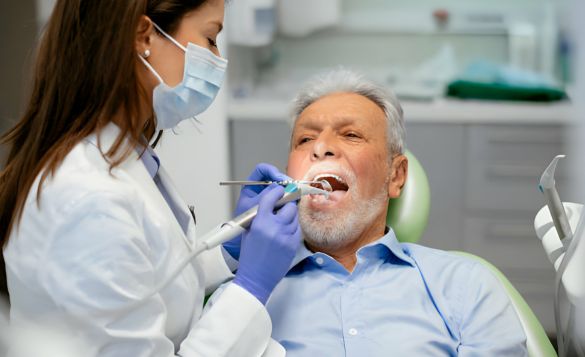
Archives
Categories


Are you missing a tooth and considering a single-tooth implant? Dental implants can be a life-changing solution, restoring your smile and confidence. However, one major concern for many individuals is the cost, particularly if they don’t have dental insurance coverage. In this article, we will explore the cost of a single tooth implant without insurance, providing you with valuable insights and guidance.
While dental implant costs can vary depending on several factors such as the location, the dentist’s experience, and the type of implant used, we aim to provide you with a general understanding of the expenses involved. We’ll discuss the different components that contribute to the overall cost, including the implant itself, any additional procedures, and the restoration (such as a crown).
By understanding the financial aspects of single-tooth implants without insurance, you can make an informed decision about your oral health and budget accordingly. So, if you’re interested in learning more about the cost of single-tooth implants and exploring your options, keep reading.

Missing a tooth not only affects your appearance but also has a significant impact on your oral health. Dental implants are a popular and effective solution for replacing a single tooth because they offer numerous benefits. Unlike traditional dentures or bridges, implants provide a permanent and stable solution that looks, feels, and functions like a natural tooth.
When considering the cost of a single tooth implant without insurance, it’s crucial to understand the long-term benefits. Implants help maintain the integrity of your jawbone, preventing bone loss and preserving facial structure. They also promote better oral hygiene by eliminating gaps where food particles can get trapped, reducing the risk of decay and gum disease.
Several factors influence the cost of a single tooth implant without insurance. Understanding these factors can help you estimate the potential expenses involved. Here are the key elements that contribute to the overall cost:
The material used for the implant and the type of implant can significantly impact the cost. Titanium implants are the most common and generally more affordable option. However, there are also zirconia implants available, which are more aesthetically pleasing but tend to be more expensive.
In some cases, additional surgical procedures may be necessary to prepare the implant site. These procedures can include bone grafting to enhance bone density or sinus lifts to create sufficient space for the implant. The need for these procedures can increase the overall cost of the treatment.
After the implant is placed, a restoration such as a crown or prosthesis is attached to complete the process. The material and complexity of the restoration can affect the cost. Porcelain or ceramic crowns are often used for a natural appearance but may be more expensive than other options.

The cost of single-tooth implants can vary depending on the region and the specific dental practice. Below are the average cost ranges for single-tooth implants in different regions:
North America: $3,000 to $6,000
Europe: €2,500 to €5,000
Asia: $1,500 to $4,000 Australia: AUD 5,000 to AUD 8,000
It’s important to note that these are general estimates and individual prices may vary. Factors such as the dentist’s experience, the location, and the complexity of the case can influence the final cost.
While dental insurance coverage can vary, it’s essential to understand how it generally applies to single-tooth implants. Dental insurance plans typically categorize implants as a major procedure and may provide coverage, although usually limited, for a portion of the cost. However, coverage may be subject to waiting periods, pre-existing condition clauses, and annual maximums.
Reviewing your dental insurance policy to understand the specific coverage details for single-tooth implants is crucial. If you don’t have dental insurance or if your plan doesn’t cover implants, you’ll need to consider the cost without insurance and explore other options.
If the cost of a single tooth implant without insurance is a concern, there are alternative options to consider. Here are a few alternatives that may be more budget-friendly:
Removable partial dentures are a traditional option for replacing a single tooth. They consist of a gum-colored plastic base with replacement teeth attached. While they are more affordable, they are not as stable or natural-looking as dental implants.
Dental bridges are another alternative to single-tooth implants. They involve using the adjacent teeth to support a prosthetic tooth. Bridges can be a cost-effective solution, but they require altering the adjacent teeth, which may not be desirable in some cases.
Dental discount plans are membership-based programs that offer reduced fees for dental treatments. While they are not insurance, they can provide significant savings on dental services, including implants. Research different dental discount plans to find one that offers discounts on implants and aligns with your budget.

If you’re concerned about the upfront cost of a single tooth implant without insurance, there are financing options available to help manage the expense. Many dental practices offer in-house financing plans or work with third-party financing companies that provide flexible payment options. These financing plans allow you to spread the cost of the implant over time, making it more affordable.
Additionally, some dental schools or teaching institutions may offer discounted rates for dental implant treatments as part of their educational programs. Research local dental schools to explore these options.
While the cost of a single tooth implant without insurance may seem high upfront, it’s important to consider the long-term benefits and return on investment. Dental implants are a durable and permanent solution that can last a lifetime with proper care.
Investing in a single-tooth implant not only improves your oral health and appearance but also enhances your overall quality of life. With a restored smile, you can regain your confidence and enjoy the ability to eat, speak, and laugh without any restrictions.
Now that you have a better understanding of the cost of a single tooth implant without insurance, you can make an informed decision about your oral health and budget accordingly. Remember to consider the importance of dental implants, the factors that influence the cost, and the alternative options available.
Research dental implant providers, explore financing options, and prioritize your long-term oral health when making your decision. A single-tooth implant may be a significant investment, but it offers invaluable benefits that can positively impact your life for years to come.
The cost of a dental implant for a single tooth can vary depending on various factors such as the location, the dentist’s experience, the quality of materials used, and any additional procedures required. On average, the cost of a single tooth implant can range from $1,000 to $3,000 or more.
The price of dental implants in Pakistan can vary depending on factors such as the location, the dentist’s expertise, the quality of materials used, and any additional procedures required. On average, the cost of a single tooth implant in Pakistan can range from PKR 50,000 to PKR 150,000 or more.
Yes, a single tooth implant can be worth it for many individuals. Dental implants offer a permanent solution for replacing missing teeth, providing stability, functionality, and aesthetics similar to natural teeth. While the initial cost may be higher than other options, the long-term benefits and improved quality of life make it a worthwhile investment for many patients.
If you prefer not to undergo dental implant surgery, there are alternative options for replacing a single missing tooth. These options include dental bridges, which involve placing a prosthetic tooth (pontic) between two adjacent teeth that are fitted with dental crowns. Another option is a removable partial denture, which is a removable appliance that replaces one or more missing teeth. It’s essential to discuss your specific needs and concerns with your dentist to determine the most suitable treatment option for you.
Our website uses cookies to improve your experience. Learn more about: Cookie Policy
Leave a Reply